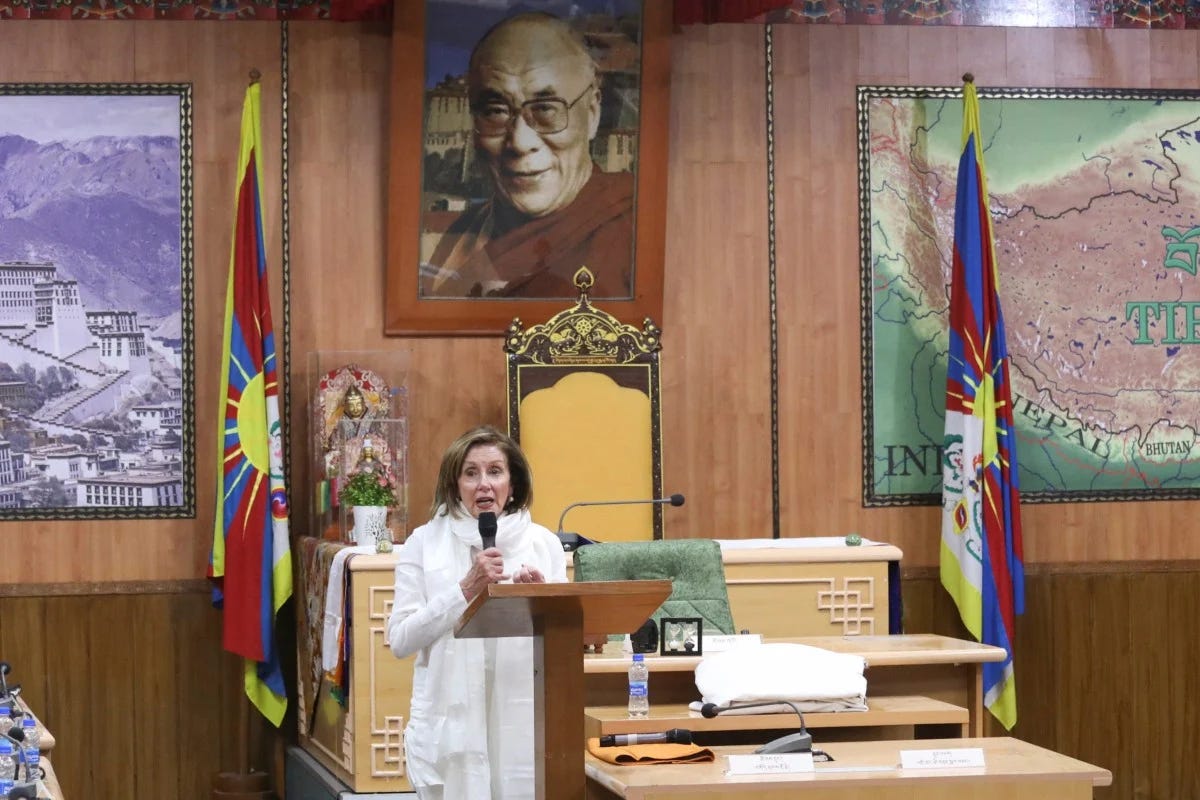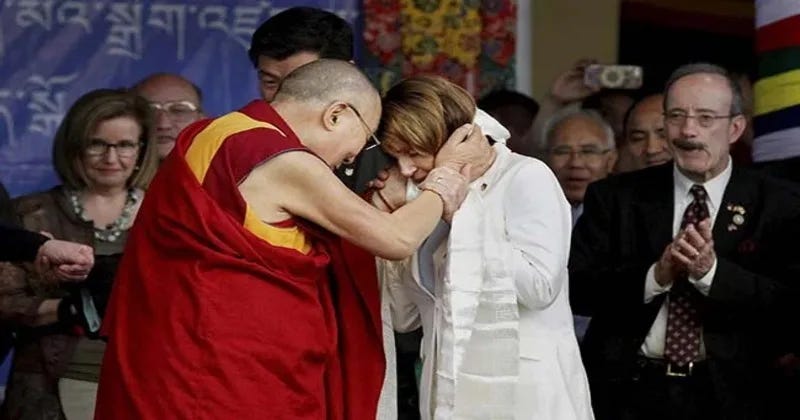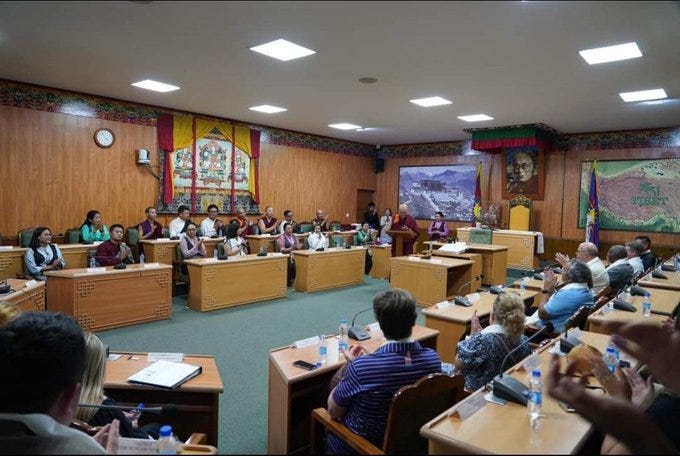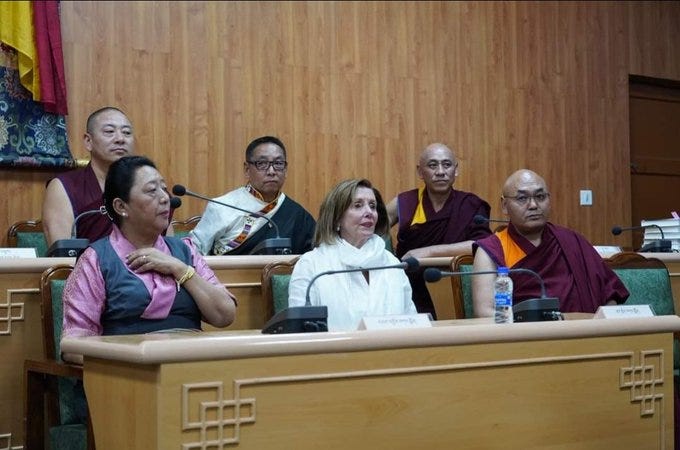Nancy Pelosi's Visit to Tibetan Parliament-in-Exile in Dharamshala Rattles China
The 7-member bipartisan delegation of the US House of Representatives includes Speaker Emerita Nancy Pelosi and Chairman of the House Foreign Affairs Committee Michael McCaul.

Pelosi's Visit to Dharamsala
On June 18, 2024, a U.S. congressional delegation, including former House Speaker Nancy Pelosi, arrived in Dharamshala, India. The delegation visited the Tibetan Parliament-in-Exile and is likely to meet with the Dalai Lama on Wednesday. This visit highlights the continuing support of the United States for the Tibetan cause and underscores the significant diplomatic tensions between the U.S. and China.
The Tibet Resolve Act of USA
The Tibet Resolve Act, officially known as the Promoting a Resolution to the Tibet-China Dispute Act, was passed by the U.S. Congress on 12th June 2024. The Act calls for China to engage in unconditional negotiations with the Dalai Lama or his representatives to address longstanding issues between Tibet and Beijing. The legislation marks a significant step in U.S. foreign policy, reflecting a hardening stance towards China's actions in Tibet. President Biden is expected to grant his formal assent to the law this week, with the visit of the congressional delegation seen as a precursor to this milestone.
The Tibetan Parliament-in-Exile
The Tibetan Parliament-in-Exile, based in Dharamshala in the northern Indian hill state of Himachal Pradesh, is the highest legislative body of the Central Tibetan Administration (CTA). Established by the 14th Dalai Lama, it aims to preserve Tibetan culture and work towards a peaceful resolution with China. Himachal Pradesh, which shares a long international border/Line of Actual Control with China, hosts this institution. The Parliament consists of representatives from the three traditional provinces of Tibet and the major Tibetan Buddhist schools, elected by the global Tibetan diaspora.
The Dalai Lama's Escape and Asylum in India
The 14th Dalai Lama, Tenzin Gyatso, fled Tibet in 1959 following a failed uprising against Chinese control. He sought asylum in India, where he established the Tibetan Government-in-exile in Dharamshala. The Dalai Lama's escape and subsequent activities have been a continual source of tension between India and China, as he remains a prominent symbol of Tibetan resistance and cultural preservation.
China's Reaction to the Visit
China reacted strongly to Nancy Pelosi's visit to Dharamshala, labelling it as an endorsement of separatist activities. The Chinese Foreign Ministry reiterated its stance that the Dalai Lama is a political exile involved in anti-China activities under the guise of religion. This visit, along with Pelosi's previous visit to Taiwan as Speaker, has further strained Sino-U.S. relations.
Historical Context of the Dalai Lama's Escape
The Dalai Lama's escape from Tibet in 1959 and his asylum in India marked the beginning of a protracted period of tension between India and China. The event led to the establishment of the Tibetan government-in-exile and has been a point of contention in Indo-China relations ever since, influencing diplomatic interactions and border conflicts.
India's Relationship with the Tibetan Government-in-Exile
India has provided refuge to the Dalai Lama and the Tibetan government-in-exile for over six decades. While India officially recognises Tibet as part of China, the presence of the Dalai Lama and the CTA in Dharamshala signifies India's support for the Tibetan cause. Although the Dalai Lama has addressed a congregation of Indian MPs in the Parliament Annexe, this is not officially regarded as an address to the Indian Parliament. Notably, no Indian Prime Minister has officially visited Tibet’s Parliament-in-exile. Prime Minister Modi was in Dharamshala during the course of his election campaign in the Lok Sabha elections, but as per India’s established foreign policy, refrained from visiting it, despite his sharp comments against India’s northern neighbour in some election meetings. This relationship remains a sensitive issue in Indo-China relations, especially in the context of recent border tensions.
Diplomatic Implications
The timing of Pelosi's visit, following the Western nations' summit on Ukraine in Switzerland, is seen as a precursor to President Biden signing the Tibet Act. This act signifies a robust U.S. stance on human rights and diplomatic issues concerning China. However, India, while hosting the Dalai Lama, is careful to maintain its sovereignty and avoid being perceived as a surrogate of U.S. policy towards China.
Summing Up and Looking Forward
Nancy Pelosi's visit to Dharamshala has undeniably rattled China, highlighting the ongoing diplomatic complexities between the U.S., China, and India. As Western nations, led by the U.S., adopt a firmer stance on China's human rights record, India's role as host to the Tibetan government-in-exile remains crucial yet diplomatically delicate. This visit underscores the evolving geopolitical dynamics and the enduring significance of the Tibetan issue in international relations.
If you believe this article would interest someone you know, please feel free to share it anonymously (for us), using any platform that you prefer.








